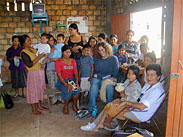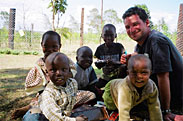Get experience around the globe
Get experience around the globe McGill University
User Tools (skip):
Arts interns around the globe
Young people may be characterized by their romantic idealism, but as nine McGill students learned this past summer, it is this youthful zest for change that fuels many humanitarian projects around the world. In an event organized by the Faculty of Arts Internship Office, students presented their experiences in places as far off as Thailand and Venezuela. This past year, with the help of the Internship Office, McGill students took part in programs in 16 different countries, with 51 organizations, across four continents.
Some returned home with tales of sleeping under mosquito nets, while others told of dinners with ambassadors and high- ranking elected officials. Each one came home with keener insight into working for a cause greater than themselves.
Fourth-year political science student Maya Ollek boarded a plane for Caracas, Venezuela, in May, when many of her peers were still searching for summer jobs. With the financial help of a Peace Studies internship, Ollek spent the next two months working at the office of the United Nations High Commission on Refugees for Northern Latin America.

Shiri Noy (centre, seated), was awarded the Tania Zouikin Arts Internship Scholarship in International Development
Two weeks prior to her arrival, a massacre in neighbouring Colombia had left hundreds of Wayuu indigenous people dead and hundreds more displaced. When Ollek arrived at the refugee slum in Venezuela, she realized that no international development or political science course could have prepared her for the devastation she encountered there. "One little girl stopped speaking because she had seen her friends murdered in front of her," said Ollek. "As soon as they heard us approach the village, they ran. It was especially difficult to deal with on an emotional level." she said. "The more I learned, the more strongly I felt about it."
The opportunity challenged her ideas about refugee issues, making Ollek redirect her focus toward protection and displacement instead of a broader emphasis on human rights. She made many valuable contacts while in Venezuela and plans to work in the field upon graduating in the spring.
For her summer vacation, fourth-year political science student Ina Sotirova returned to her native Bulgaria to lend her efforts to the Ministry of Foreign Affairs. The experience gave Sotirova, who is fascinated by European politics, insight into what she called the asymmetrical relationship between Bulgaria and the European Union. "It allowed me to experience European history in the making," said Sotirova. The occasion also gave her ample opportunity to refine her debating skills in meetings with diplomats, civil servants and other government officials. The rest of her days in the nation's capital of Sofia were spent organizing press conferences, proofreading and working alongside the Minister of Foreign Affairs.
The internships brought other students a renewed commitment to causes they already championed in their academic and personal lives. Honours anthropology student Rachel Sandwell has turned her work with Thailand's HIV organization Rejoice into an honours thesis. She spent the summer working at the Chiangmai office, thanks to the Arsenault Family Scholarship, collecting research and working with the field team to treat 600 people per week.

Andrew Bauer-Gador (right), a recipient of the Faculty of Arts Internship Award
"I learned a great deal about the AIDS epidemic in Thailand and the ways that it affects all areas of family life," said Sandwell. Although the Thai government claims it has the AIDS crisis under control, Sandwell said based on her experience, this is simply not true.
Economics student Noreen Karachiwalla had her eyes opened to the realities of development projects and the problems in getting resources to those most in need. She divided her summer in Nairobi, Kenya, between three organizations: microleasing enterprise K-Rep, Honey Care Africa and Africa Now, a group responsible for selling honey and giving beehive-harvesting training.
"Despite the general conception, microfinance rarely reaches the poorest of the poor because it depends on loans being repaid," said Karachiwalla. While K-Rep leases hives to adolescent girls, the elderly and people living with HIV/AIDS, Karachiwalla noted this is only useful for those with the resources to set up a stall in the marketplace to sell their products.
Despite the problems facing microlending and financing projects, she remains optimistic. "Micro-finance is a field I plan to continue studying and work in," said Karachiwalla. "I have seen that it can have a far-reaching effect." She is currently working on sending other students over to work with K-Rep.
Karachiwalla was joined in Kenya by third-year political science student Andrew Bauer-Gador, who worked for Transparency International in Nairobi. Environmental development student Shiri Noy assessed health projects in Minga, Peru, and Leigh Hardy strengthened relations with El Salvador through VIVA, an organization she founded five years ago. Colombian native Claudia Minez-Ochoa represented her country at the United Nations in New York as an assistant to the First Secretary. International development student Blanka Fuleki worked with a United Nations development program for Eastern Europe, in Bratislava, Slovakia.
Internship officer Anne Turner encourages students to begin thinking now about exciting projects for the summer. "Most students began their research in November and applied by January," said Turner. An early start makes it much easier to seek out funding, which may be made available through the university or various charitable foundations. Upon completing 150 hours of work, students may also receive three credits for their internship.
For more information, stop by the office in Peterson Hall, room 314, 3460 McTavish Street, or visit www.mcgill.ca/arts-internships.
